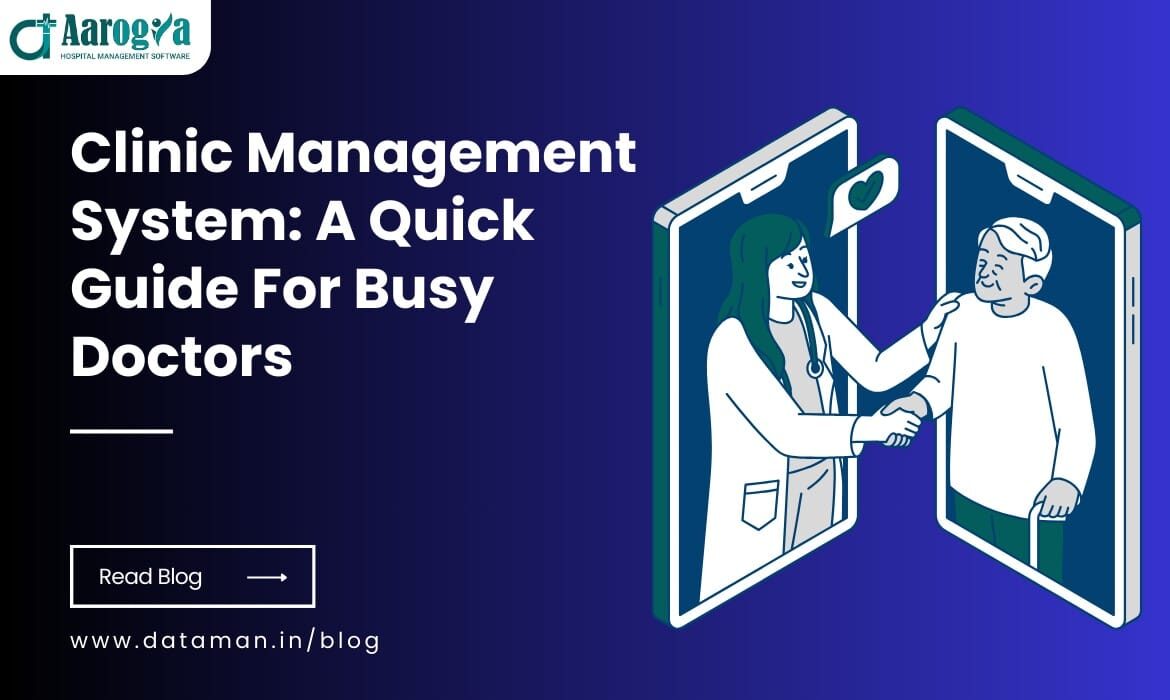 Core Web Vitals Boost – Speed Up Your Site & Your SEO!
Core Web Vitals Boost – Speed Up Your Site & Your SEO!
Clinic Management System: A Quick Guide For Busy Doctors
Written by Dataman Computer Systems Pvt Ltd » Updated on: June 17th, 2025

A Clinic Management System is essential software designed to streamline and optimize clinic operations and enhance healthcare delivery. Beyond patient care, clinic operations and administration involve maintaining the clinic premises, staffing records, and overseeing various departments (such as laboratory, pharmacy, and housekeeping). Additionally, clinics manage inventories, coordinate with diagnostic labs, and collaborate with medical equipment vendors.
The dynamic nature of clinics involves repetitive tasks, data generation, record-keeping, and adherence to regulatory policies. A Software-as-a-Service (SaaS) clinic management system seamlessly integrates these functions, enhancing efficiency for both patients and Staff.
The typical workflow in a clinic encompasses several steps:
Appointment Scheduling and Management: Patients schedule bookings with an online scheduler accessible to them 24/7. Practitioner manages appointments, calendars and sets reminders to reduce missed appointments and streamlines waiting room management.
Electronic Health Records (EHR): EMR and EHR software are main features of clinic management systems. EHR provides secure storage and access to patient medical records, including medications, allergies, and lab results.
Medical Consultation: The doctor meets with the patient, provides medical advice, and recommends necessary diagnostic tests or medications.
Billing and claims: Automate insurance claim submissions, generate invoices, and track payments electronically. This reduces administrative burden and improves cash flow.
Access to Clinic Services: Patients can access the clinic’s laboratory and pharmacy as needed. The clinics can facilitate tele-calling and tele-medicine to their patients with the help of the solution.
Reporting and analytics: Gain valuable insights into clinic performance metrics like appointment volume, staff productivity, and financial trends. Data-driven insights help you make informed decisions for improving efficiency and profitability.
Communication tools: Stay connected with patients through secure messaging, appointment reminders, and telehealth options. Streamlined communication fosters patient engagement and satisfaction.
Security & Compliance: Features to ensure patient data privacy and HIPAA compliance.
Why Do You Need a Clinic Management System?
Improved Patient Experience: Did you know that 72% of patients do not visit clinics after booking their appointments due to scheduling difficulties? A CMS eliminates this frustration with online appointment booking, automated reminders, and telehealth options. Additionally, secure patient portals allow for easy communication and access to medical records, fostering trust and engagement.
Convenient online scheduling, easy access to records, and efficient communication contribute to a 92% increase in patient satisfaction, according to Software Advice.
Enhanced Operational Efficiency: Gone are the days of paper charts and manual tasks. A CMS can automate appointment scheduling, billing, and claims management, freeing up your staff to focus on what matters most – patient care. Streamlined workflows and real-time reporting empower you to make informed decisions and optimize resource allocation.
Studies show that CMS can reduce administrative tasks by up to 40%, freeing up valuable time for patient care.
Financial Optimization: A CMS helps you stay on top of your finances with automated billing, claims submission, and payment processing. You can track revenue and expenses in real-time, identify areas for improvement, and ensure accurate and timely payments.
According to the Medscape Physician Compensation Report for 2023, physicians spend an average of 15.5 hours per week on paperwork and administration. Studies also show that CMS adoption can lead to a 20% reduction in administrative costs.
Regulatory Compliance: Navigating the ever-changing healthcare regulations can be overwhelming. A CMS simplifies compliance with built-in features for data security, privacy protection, and reporting requirements. This peace of mind allows you to focus on running your practice without fear of penalties or violations.
Reduced Costs: Did you know that administrative inefficiencies cost healthcare providers $360 billion annually? A CMS helps control costs by reducing paperwork, optimizing inventory management, and improving billing accuracy.
Data-Driven Insights: Clinics can measure how many patients are coming and from which place. Patient’s information is stored in the system, so clinic’s can provide an area estimate for any service. To identify new and returning patients, the system tracks patient history. Appointment data shows how many new patients are booking compared to returning ones.
Clinics can track which doctors have the most appointments booked and they can conduct surveys to see which doctors patients prefer. This data-driven approach empowers you to make informed decisions about resource allocation, marketing strategies, and overall clinic growth.
Industry statistics further highlight the need for CMS adoption:
73% of healthcare providers believe investing in technology helps them deliver better patient care.
Patients are willing to pay 10-20% more for services from a clinic with a user-friendly patient portal.
Click for book A Free demo Now
Note: IndiBlogHub features both user-submitted and editorial content. We do not verify third-party contributions. Read our Disclaimer and Privacy Policyfor details.
Copyright © 2019-2025 IndiBlogHub.com. All rights reserved. Hosted on DigitalOcean for fast, reliable performance.







